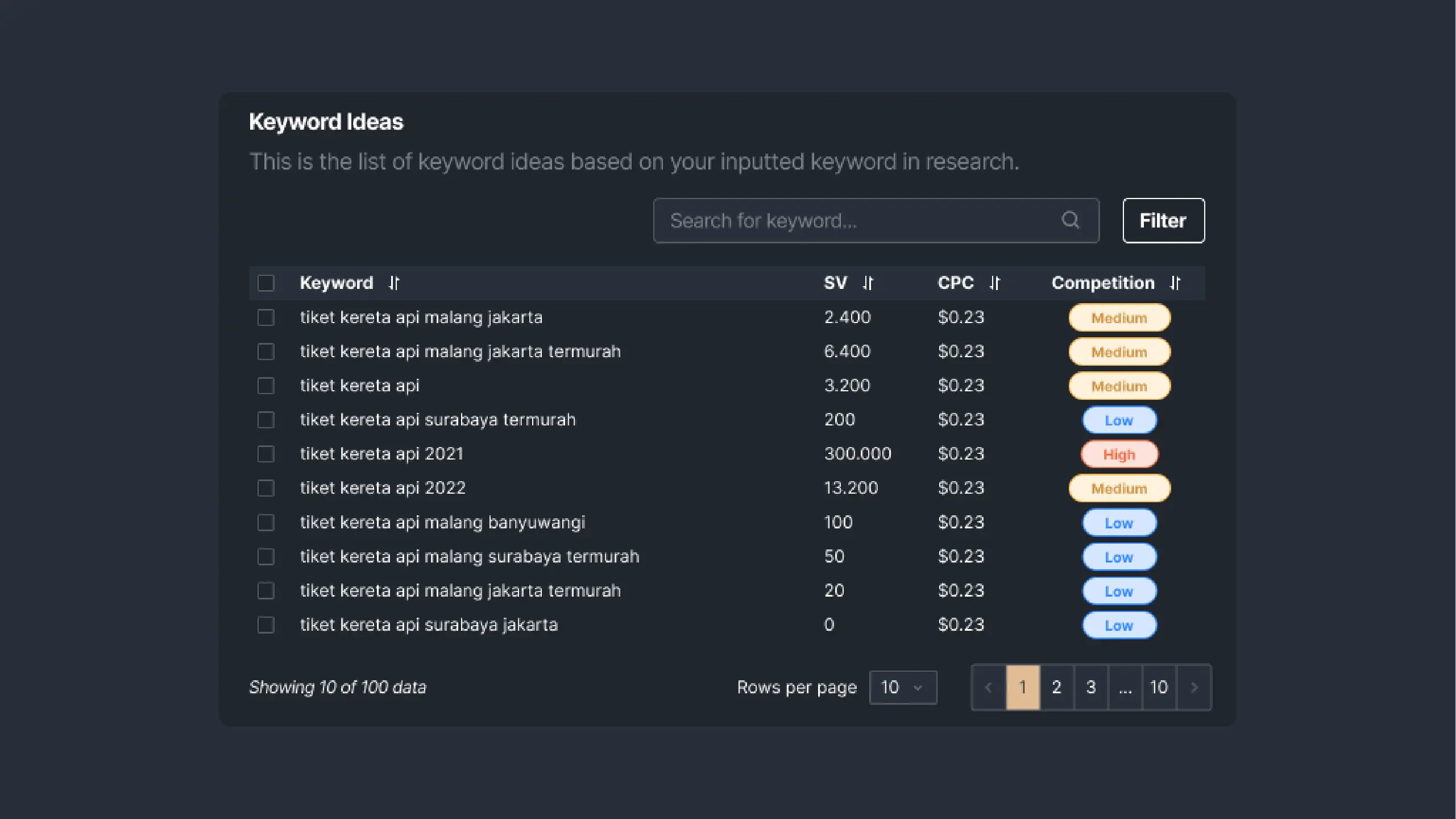The competition between industries in the search engine is getting tighter day by day. Thus, even small businesses enable SEO as their long-term strategy. So, why doesn't enterprise enable SEO? As enterprises operate on a grand scale, their online presence and visibility directly impact their brand reputation and overall revenue.
Enterprises are defined by their size, revenue, and global reach. These companies typically have a significant market share, multiple business units, and a vast customer base. Due to their substantial online presence, enterprise SEO requires a different level of planning and execution compared to small or medium-sized businesses.
Read the rest of the article to gain insight into what an SEO enterprise looks like, what tool should be used, and the best practices.
What Is SEO Enterprise and Why Should You Care?
SEO enterprise is an optimization strategy crafted and personalized for enterprise-level business. In the realm of enterprise SEO, a disorganized approach is simply not enough. A well-structured SEO strategy is the foundation for achieving sustainable and impactful results.
By setting clear objectives, aligning SEO efforts with business goals, and creating a roadmap for execution, large enterprises can unlock the full potential of their SEO campaigns and stay ahead of their competition.
If you want a sustainable business that can compete in the search engine, SEO is the solution. SEO enterprise is a long-term optimization where you need everyone involved in the never-ending tasks. However, this is an effective way to gain search engine market share. Thus, you should consider SEO enablement at this moment.
The Unique Challenges of SEO Enterprise
Large enterprises encounter a distinctive set of challenges and opportunities when it comes to SEO. Here are the challenges of enterprises in enabling SEO.

Picture 1: Illustration of unique challenges faced by enterprises in implementing SEO.
1. Complex Website Structure
Large enterprises often have expansive websites with numerous pages, sections, and subdomains. Managing such a complex site structure requires careful organization and optimization to ensure that search engines can effectively crawl and index all relevant content.
2. Cross-Departmental Coordination
Enterprises typically have multiple departments and teams involved in their online presence, ranging from marketing to IT to product development. Aligning SEO enterprise efforts across these various departments can be challenging, as it requires effective communication and collaboration.
3. Competition in Competitive Markets
Large enterprises frequently operate in highly competitive industries, where dominating search rankings can be fiercely competitive. Outperforming rivals for valuable keywords and securing top positions in search results demand robust SEO strategies.
4. Slow Implementation Processes
Implementing changes across large enterprises can be time-consuming due to bureaucratic structures and lengthy decision-making processes. This slow implementation can hinder the agility needed to respond quickly to SEO trends and algorithm updates.
Top 7 SEO Strategies for Enterprise Level
To be honest, there are far more than just 7 SEO enterprise strategies that should be implemented at an enterprise level. However, these 7 strategies are a good starting point for every enterprise that wants to activate SEO.
1. Comprehensive Website Audit
Before starting SEO implementation, a website audit is a must. Conduct a thorough website audit to assess the overall health and performance of your website. This includes identifying technical issues, broken links, and crawl errors that may hinder search engine indexing.
An audit will reveal opportunities for optimization, allowing you to address issues early on and set a strong foundation for future SEO efforts. You can use an audit tool for your SEO enterprise that can provide comprehensive results.
2. Keyword Research and Targeting
Next, you need to have target keywords that are valuable for business relevance. Thus, you need comprehensive keyword research. Keyword research is the process of identifying relevant search terms that your target audience uses to find products, services, or information related to your industry.
Utilize keyword research tools to identify high-traffic and low-competition keywords that align with your business offerings. Targeting the right keywords ensures your content ranks well and attracts qualified traffic.
For the enterprise level, the number of keywords to target can be massive and you need to find a tool that can manage them all together. Keyword grouping and monitoring is tricky in SEO, you need to be careful while doing it.
3. Content Creation and Optimization
The next SEO enterprise strategy is to optimize existing content to incorporate targeted keywords naturally. Ensure your content addresses the search intent of users and provides valuable information. Additionally, focus on creating fresh and engaging content that resonates with your audience's interests.
High-quality content not only improves search rankings but also encourages user engagement and establishes your enterprise as an industry authority.
4. On-Page SEO Best Practices
On-page SEO involves optimizing individual web pages to improve their search engine rankings and attract organic traffic. This SEO enterprise often focuses on optimizing meta tags (title tags and meta descriptions) with targeted keywords. Use proper heading tags (H1, H2, etc.) to structure your content and make it easily scannable for users and search engines.
Not only that, but enterprises should create descriptive and keyword-rich URLs for each page. This will help search engines read and understand the page easily.
5. Build a Strong Link Profile
In the early stages of SEO enterprise enablement, start building a strong link profile by earning high-quality backlinks from reputable and relevant websites. You can get it by involving in Guest posting on authoritative industry blogs, forming partnerships with complementary businesses, and creating shareable content that can help attract valuable backlinks.
A strong link profile signals to search engines that your content is trustworthy and valuable. However, the enterprise level has the potential to get backlinks because they engage in a large-scale business that already has authority.
6. Technical SEO
Technical SEO for enterprise-level businesses involves optimizing the technical aspects of a website to improve its performance, crawlability, and indexation by search engines. This process is crucial for large-scale enterprises with complex websites, as it ensures that search engines can effectively access, understand, and rank their content.
7. Monitor and Measure Performance
The last SEO enterprise strategy you can’t forget is monitoring. In this matter, you can have analytics tools such as Google Analytics and Google Search Console to monitor your website's performance regularly.
Analyzing performance metrics allows you to identify what is working well and what requires improvement, enabling data-driven decision-making for future SEO strategies.
By implementing these deeper-level strategies early on, your enterprise can establish a strong SEO foundation and set the stage for continued growth and success in the competitive digital landscape. As you progress and gain more experience in SEO, you can further refine and expand these strategies to achieve even greater results.
Enterprise SEO Tools
At the enterprise level, the tool used is varied adjusting to their needs. We have mentioned previously that you will need Google Analytics and Search Console to monitor the performance. However, we have one SEO tool that can accommodate almost all the above strategies simply in one dashboard.
Sequence Stats is a powerful enterprise SEO tool designed to streamline and optimize various aspects of an enterprise-level SEO campaign. It offers a range of capabilities that enable efficient management and analysis of SEO data. Here's how Sequence Stats fulfills the mentioned abilities:
1. Conduct a Thorough Site Audit
Sequence Stats allows enterprises to perform comprehensive site audits, identifying technical issues, on-page SEO gaps, and opportunities for improvement.
Through automated scanning and analysis, the tool can detect broken links, duplicate content, and other technical SEO issues that might hinder search engine crawling and indexing. You can also schedule a site audit so that you don’t have to do it manually.

Picture 2: Site Audit dashboard in Sequence Stats that show various issues.
2. Track Keyword Ranking and Performance Daily
Sequence Stats provide daily keyword tracking and performance monitoring, allowing enterprises to stay up-to-date with their search rankings. This tool can also be your enterprise SEO reporting tool that reports daily keyword performance.

Picture 3: Rank dashboard in Sequence Stats to monitor all targetted keywords for enterprise website.
3. Group Big Keyword Data
Sequence Stats offers the ability to group keyword data efficiently. Enterprises can create custom keyword groups based on topics, search volume, or target audience segments. This enables better organization and analysis of keywords.

Picture 4: View feature in Sequence Stats to group keywords.
4. Comprehensive Keyword Research
The tool supports comprehensive keyword research through the Keyword Ideas modul, providing and suggesting relevant keywords based on user queries and search trends. Enterprises can uncover valuable long-tail keywords, assess search volume, and analyze keyword competition to shape their content and SEO strategies effectively.

Picture 5: Keyword Ideas dashboard
5. Manage Multiple Teams and Domains
Sequence Stats is designed to accommodate the needs of enterprise-level businesses, allowing seamless management of multiple teams and domains. Enterprises can set user roles and permissions to ensure secure access to SEO data and analytics across different teams and domains.

Picture 6: Multi-team and domain management in Sequence Stats.
In summary, Sequence Stats serves as a robust enterprise SEO tool that empowers businesses to conduct almost all SEO tasks within one tool only. With these capabilities, enterprises can optimize their SEO strategies without needing to subscribe to multiple tools. Remember, a free trial is available!